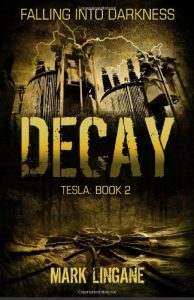 Decay is the second book in the Tesla Evolution series by Mark Lingane, following on from the first book, Tesla. In the war-torn future, in the only known pocket of existence left for humanity, a war for supremacy between cyborgs with their technological dominance and humans, some with newly-discovered near-magical abilities, and steam-powered machinery comes to a boil and draws in the likes of Sebastian – a new recruit to the Steam Academy – as well as his friends and allies met during his journey. After a tiring battle claims countless lives and nearly destroys the last safe city known to humanity, we join Sebastian, Melanie, teacher Nikola and others at a time when battle is a daily chore and defenses are slowly but surely eroding away. That is until a new revelation about the cyborgs comes to light, and provides hope to humanity, perhaps even all of it.
Decay is the second book in the Tesla Evolution series by Mark Lingane, following on from the first book, Tesla. In the war-torn future, in the only known pocket of existence left for humanity, a war for supremacy between cyborgs with their technological dominance and humans, some with newly-discovered near-magical abilities, and steam-powered machinery comes to a boil and draws in the likes of Sebastian – a new recruit to the Steam Academy – as well as his friends and allies met during his journey. After a tiring battle claims countless lives and nearly destroys the last safe city known to humanity, we join Sebastian, Melanie, teacher Nikola and others at a time when battle is a daily chore and defenses are slowly but surely eroding away. That is until a new revelation about the cyborgs comes to light, and provides hope to humanity, perhaps even all of it.
Decay is a significantly darker outing than the previous installment, where the first was more of a quest to discover Sebastian’s destiny and his mother’s fate, Decay has no such strong light at the end of the tunnel. The theme of the book is stagnation and despair, with small hopes and bitter disappointments nudging characters along simply because they have to. This is in no way a failing of the book’s writing, which is excellent and in fact a notable improvement from the first across the board; the tone of the book is well set and motivations of the various characters have become more individual and complex. Aside from a desire for the simple ability to exist now, we see differing opinions on how to proceed from reconciliation, to study, to straight, unrelenting war. These are presented subtly and nobody at this point in the story is considered particularly wrong in what they believe, even the so-called “enemy” who are now much less painted as thoughtless monsters and more as necessary evils at worst; tortured, human souls at best. The Academy is given more shades of gray along with everything else, and distinct and flavorful culture is presented for everything now that the concepts have been established. The quirks of the societies in play are well thought out, even if a couple of ideas will be easily dated in time, such as a reference to Twitter in the introduction of a character named “@summer14Rose” (“@summer” was already allocated.) For some these occasional nudges will make the book a joy, and they are thankfully not ham-handed in their use or presentation.
The presentation and editing of the book is, again, excellent and an overall improvement from the first book. The overall tongue-in-cheek levity of the first has faded with the serious nature of the sequel and has now become a more somber and complex affair, but with the same witty and unusual author behind the wheel to provide a fun and enjoyable edge to the piece again. The camp concept of steampunk versus cyberpunk has been turned into a deep and rather realistic, believable book that retains its winks and nods in the right places to remind the reader not to get bogged down. The book is gentle when it needs to be and hard when the bolts hit the fan, and there’s not really a boring paragraph in it. With a sequel on the way soon – Faraday – Lingane is certainly an author to pay close attention to this year and in the future.
Links
Amazon
Goodreads
Barnes & Noble
Review Overview
Design
Content
Editing
Get an Editorial Review | Get Amazon Sales & Reviews | Get Edited | Get Beta Readers | Enter the SPR Book Awards | Other Marketing Services






















Leave A Comment